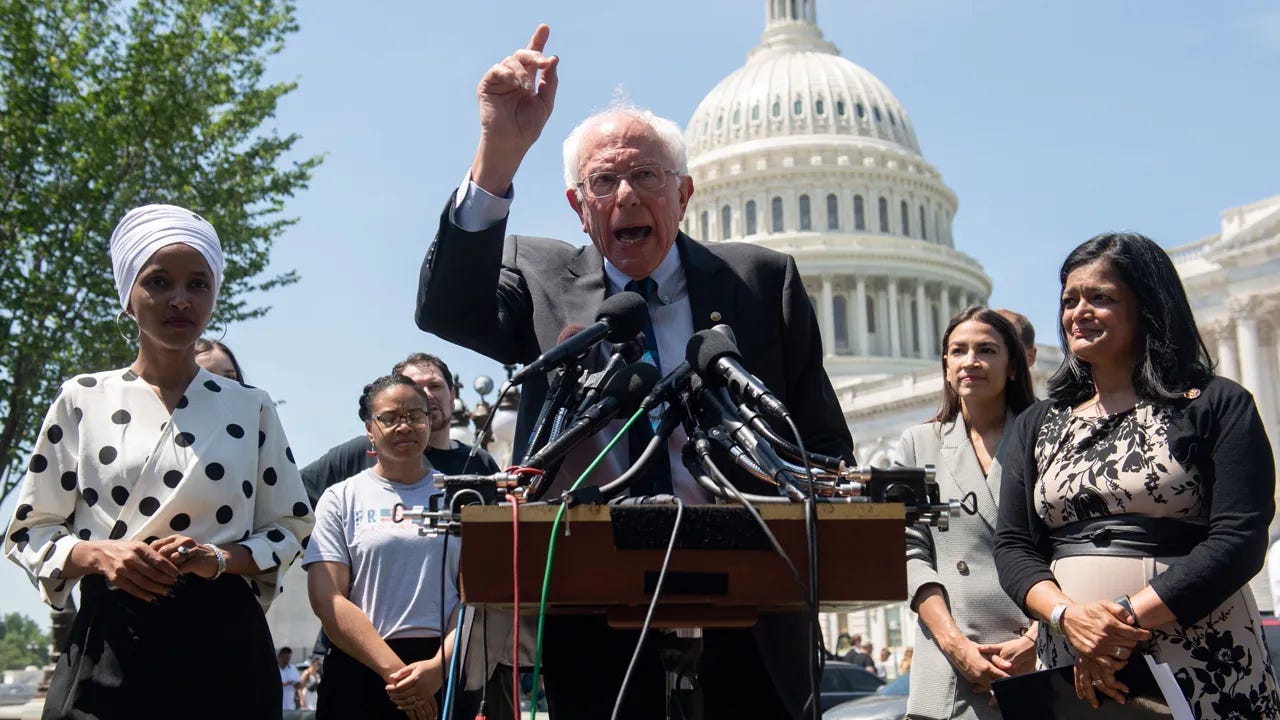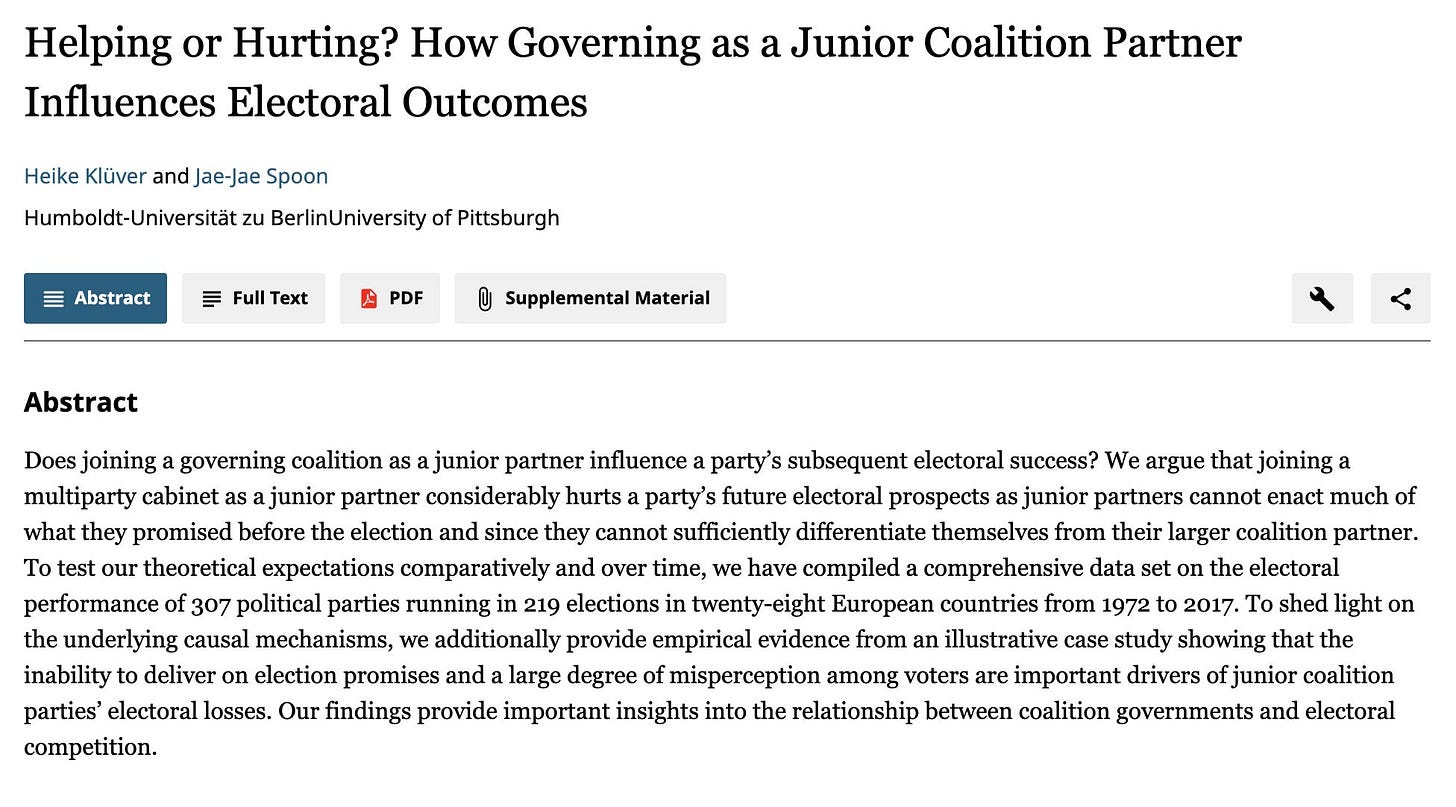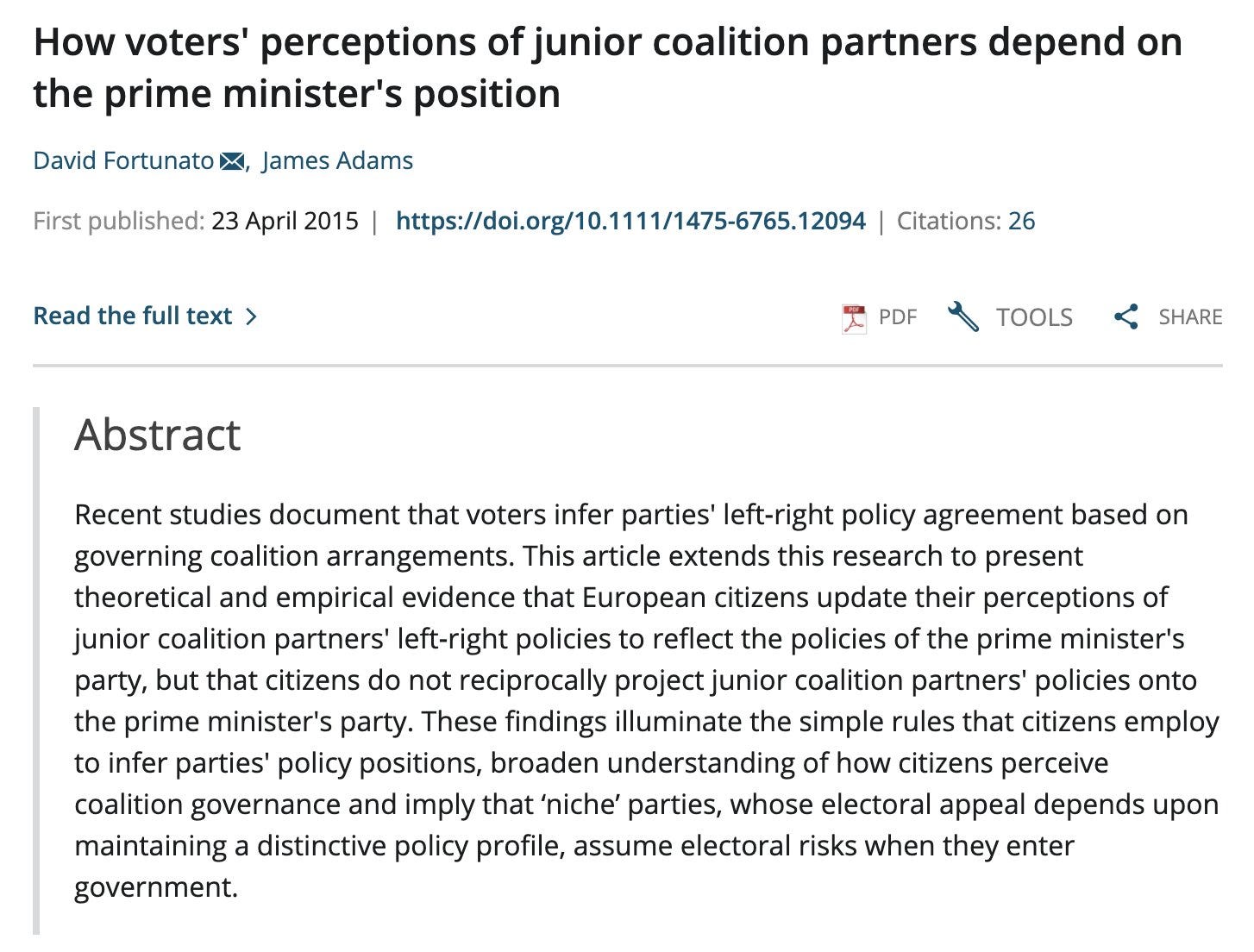The Burden of the Junior Partner
The Left’s Catch-22: Blamed for the Losses, Erased from the Wins
To understand the last decade of progressive politics, you have to begin with a structural reality too often ignored: in the American system, there is no such thing as governing from the outside. Power flows through the Democratic Party, and for the left, that means entering as the junior partner in legislative and party coalitions it does not control. This isn’t a glitch in the system—it’s gravity. The structure of American politics exerts a constant force: you can’t escape it, only learn to move within its pull.
We’re seeing this play out now, as moderate strategists and party elites begin pointing fingers at the left—not just as a faction that overreached, but as the reason the broader governing project failed. It’s a familiar pattern in coalition politics: when things go wrong, blame flows to the junior partner.
And like junior partners in coalition governments around the world, progressives bring social movements, constituencies, policy ideas, and electoral legitimacy to the table, but without the institutional power to dictate terms, they are blamed for compromises they didn’t make and held accountable for outcomes they couldn’t control.
What makes the American context even more punishing is that there’s no clear boundary between factions: unlike in parliamentary systems, where junior partners often retain distinct brands and negotiate written coalition agreements, the U.S. left functions as a loosely organized faction within a sprawling, ideologically incoherent party. With no formal role and no independent infrastructure to clarify its wins, the junior partner ends up absorbing exposure with little leverage. That’s the dilemma at the heart of the progressive experience in the Biden era. And it’s the starting point for understanding both the past two years and the road ahead.
For the better part of a decade, the progressive wing of the Democratic Party didn’t just appear ascendant; it looked like the future. Economic populism, climate justice, and racial equity, long relegated to the margins, were suddenly central to national debate. Bernie Sanders didn’t just popularize a vision of social democracy; he demonstrated that it had a mass, cross-generational constituency. The Squad didn’t merely win elections; they dethroned urban machine incumbents and carried forward the energy of millennial-led social movements, the failures of centrism, and the unfinished promises of the Obama era.
From 2016 through 2022, it appeared the left was building the early architecture of a realignment. A pipeline emerged from the Sanders campaign to a new progressive infrastructure—imperfect, but tangible, not unlike the arc from Goldwater in 1964 to Reagan in 1980. Ed Markey’s victory over a Kennedy, powered by the Green New Deal movement, signaled generational and ideological change. Reform prosecutors like Chesa Boudin and Larry Krasner won on platforms that reimagined the criminal legal system. In 2020, the largest civil rights and racial justice protests since the 1960s erupted across the country. Ideas once relegated to activist white papers—student debt cancellation, labor law reform, green industrial policy, and an end to mass incarceration and deportation—became live policy debates. The movement wasn’t just insurgent. It was coherent, growing, and—for a moment—beginning to govern.
Progressives earned their place in the Democratic Party’s coalition by winning Democratic primaries in key urban and diverse districts, demonstrating that they represented the party’s most engaged and loyal base of voters — and that they could unseat Democratic Party incumbents, or their hand-picked candidates in open-seat primaries. Through the Squad’s victories, the electoral strength of Bernie Sanders’ presidential campaigns, the policy infrastructure of Elizabeth Warren, and the moral urgency of climate and racial justice protests, they embodied the party’s grassroots desire to move beyond neoliberalism toward a politics rooted in social democracy, corporate reform, and racial justice.
But politics keeps score with no sense of history or context. It tallies wins and losses in real time, indifferent to the slow, uneven arc of ideological transformation. Movements are judged by the last cycle, not the last decade—let alone the decades still to come. In that ledger, there’s little room for context: no accounting for structural asymmetries or the long view. Only the latest headlines matter. And by that unforgiving metric, the past two years have been difficult for the left’s electoral project.
The left began to run up against the limits of what was possible in the post–Citizens United era without deeper infrastructure and institutional power, especially amid mounting backlash to asylum seekers, the Black Lives Matter and #MeToo movements, and growing anxiety over inflation. The 2023 and 2024 cycles brought few new insurgent breakthroughs. Reform prosecutors were ousted. Climate policies were gutted behind closed doors, and lacked scale and speed of deliverism’s fantasies of FDR and LBJ-style programs. Super PACs aligned with AIPAC and cryptocurrency billionaires flooded districts and knocked out core Squad members like Jamaal Bowman and Cori Bush. The organized backlash set out to break the left’s pipeline to formal power.
In the aftermath of Trump’s return, the postmortem has hardened into a strategy: blame the left. The Squad asked too much. Environmentalists and racial justice advocates pushed too hard. The story now told by establishment-aligned operatives and pundits is simple: Biden and Harris didn’t lose because they governed too cautiously, but because progressives made them look out of touch.
This is the familiar logic of coalition politics. Around the world, junior partners get scapegoated when things fall apart.
This dynamic isn’t unique to American progressives. Political scientists studying coalition governments across Europe have consistently found the same pattern: junior partners in governing coalitions are structurally disadvantaged. They campaign on bold promises, but without the seats or leverage to back them up, they’re left unable to deliver. They enter government to shape policy but often get swallowed by it. Forced to compromise without setting the agenda—and unable to clearly distinguish themselves from their senior partner—progressives are often dismissed by moderates as performative and derided by left critics as sellouts, caught between accusation and expectation.
In many parliamentary systems, junior partners rarely receive credit—even when their ideas shape the governing agenda. Voters typically reward the senior partner, who holds the top job and is seen as the face of government, for any popular policies enacted under the coalition. Even when the senior partner adopts the junior’s proposals, they are credited as the deliverer, not the borrower. Meanwhile, the junior partner’s identity blurs, their influence is hidden in the machinery of governance, and they are often punished by their own voters for compromises they had little power to avoid. It’s a lopsided equation: the senior partner gets the credit; the junior partner absorbs the risk and blame.
Even the real wins—like key provisions in the Inflation Reduction Act, the appointments of Lina Khan at the FTC and Bharat Ramamurti at the NEC, and the quiet revival of antitrust policy by Warren-aligned wonks—have been too technocratic and buried in bureaucratic process to even register with most activists or voters as progressive victories. These were not accidents; they were hard-fought concessions, secured through years of primary challenges, ideological pressure, and the leverage built by Sanders, Warren, the Squad, and an increasingly organized Progressive Caucus. But because the victories lacked visibility—and because they were ultimately implemented by the Biden administration—many didn’t see them as wins for the left at all. And for some activists, policy improvements aren’t enough; if they reinforce the legitimacy of a senior partner they hope to displace, then even success can feel like failure.
That’s the bind: progressives must show they can govern and deliver—but every win risks being credited to the very forces they’re trying to transform, and every failure risks confirming the suspicion that they’re either too weak to matter or too compromised to trust.
Progressives had little choice but to support the Biden administration—they helped deliver the presidency and the Democratic majorities, and in return, secured real if limited gains: student debt relief, green industrial policy, a revived antitrust agenda. But they lacked the numbers to set terms or enforce red lines. There were no formal coalition agreements, no cabinet posts to anchor their influence, as there often are in multi-party systems abroad. When Build Back Better collapsed under the weight of Manchin and Sinema (the other members of the coalition), progressives didn’t have the leverage to stop it. With no clear boundary between the party’s left and center, many blamed the entire Democratic coalition for failing to deliver, and pundits moved to criticize most harshly the faction that had promised the most.
The American experience follows a pattern political scientists have documented across parliamentary systems: when junior partners enter government, voters don’t credit them for shifting the agenda—they assume the junior partner has simply aligned with the senior one. In the U.S., that means when figures like Bernie Sanders or AOC support a Democratic administration, voters often interpret it not as Biden moving left, but as the left falling in line. Despite endless punditry about a progressive shift, the political science about coalition governments suggests the opposite: the dominant party’s brand stays intact, while the junior partner’s gets blurred.
This is the structural, difficult-to-avoid trap of junior partnership. You carry the expectations of your boldest promises, but not the authority to fulfill them. You get visibility without insulation, accountability without control. And in the absence of new electoral wins in 2023 and 2024 to reset the story, the dominant narrative calcified: progressivism hadn’t stumbled—it had peaked. The backlash landed before the movement’s pipeline had time to mature.
The debate within the progressive ecosystem is now shifting—from ideology to terrain. Should the focus be on building governing blocs in city halls and state legislatures as Trump controls the federal government? On contesting open primaries in swing districts, where left challengers could defeat DCCC centrist picks and prove their appeal beyond urban cores? Or on rebuilding the labor movement from the shop floor up?
Each path has merit. But none can succeed if the foundation is eroding—and that foundation remains Democratic primaries in blue cities, districts, and states. Once the most accessible arena for progressive gains, they’ve become increasingly fortified—not because the left has grown weaker, but because its potential has become more threatening to the party’s donor class and centrist establishment. If progressives can’t win and deliver where the base is densest—can’t unseat incumbents, can’t win primaries, can’t govern cities and states in ways that resemble even modest European social democracy—then it’s hard to argue the project is ready to scale.
Primaries aren’t just one tactic among many. They’re the clearest test of where the party’s voters want it to go—of which ideas, coalitions, and leaders have a mandate to shape its future. When progressives win primaries, it signals not just ideological coherence, but popular backing for a specific policy agenda and political direction. It shows that the base of the party aligns with a more ambitious, redistributive vision. If progressives can’t win those contests—especially in deep-blue districts—then it’s not just a tactical setback. It calls into question whether the movement’s core ideas still command majority support among Democratic voters. And if that foundation weakens, the rest doesn’t get off the ground.
As Timothy Shenk writes in The Realigners, American political history is shaped not just by moral clarity, but by the capacity to wield institutional power. Realigners—figures like Charles Sumner, Frances Perkins, and Bayard Rustin—understood that the work of transformation required alliances, patience, and control over the machinery of governance. They didn’t scorn coalitions. They mastered them. The left’s core dilemma isn’t simply that it became a junior partner in the Democratic coalition—it’s that it got there fast, without the infrastructure, personnel, or institutional depth to shape what came next and to fend out corporate-backed interests. This wasn’t a failure of strategy or ambition but a structural reality of America’s two-party system. The only path forward is through the bind: more strategic campaigns, more governing wins, and a more disciplined use of power to build the architecture needed to lead—not just participate.
That’s the moment where many movements break. The base turns inward. Disappointment curdles into disengagement. The conclusion is drawn: becoming a junior partner was the original sin. But that misreads the terrain. . We don’t have proportional representation or a third party safety valve. The Democratic primary — and its voters — is a core battlefield. And becoming a junior partner isn’t a detour; it’s the first step on the only path to power.
Winning Democratic primaries is how the left first proved its viability. It’s where we won seats, moved policy, and earned concessions. To cede that ground to our adversaries now would be to validate the very forces trying to destroy the progressive bench before it consolidates. We need to grow the Squad, expand the Progressive Caucus, and defend every single incumbent under siege by Republicans, cryptocurrency and AIPAC-aligned Super PACs. And around them, we need to build the institutional scaffolding—organizing networks, policy shops, staffer networks, media infrastructure—that can anchor their power beyond one election cycle.
So no, this isn’t a call to cast aside the torchbearers. But if the goal is more than a righteous presence—if the aim is actual governing power—then it’s time to build something sturdier. The left didn’t just move the Overton window between 2018 and 2022—it cracked open the door. What comes next is less about inspiration and more about institution: investing in the kind of durable infrastructure that doesn’t just shift the debate, but settles in and realigns the terms of power itself.







"For the better part of a decade, the progressive wing of the Democratic Party didn’t just appear ascendant; it looked like the future. Economic populism, climate justice, and racial equity, long relegated to the margins, were suddenly central to national debate."
True. Biden was by far the most progressive president since FDR (maybe ever). He was progressive beyond my wildest hopes.
"Biden and Harris didn’t lose because they governed too cautiously, but because progressives made them look out of touch."
Absolutely true. Progressives said they wanted $10,000 in debt forgiveness. Biden agreed, and then they immediately changed the number to $50,000, then $100,000, then unlimited, with no income limit. When Biden set income limits of $125,000 per person or $250,000 per couple, they whined and screamed and insisted that doctors and lawyers making much more than that should have hundreds of thousands of dollars in law school and med school debt forgiven. This was so suicidally counterproductive that I had to wonder if they were helping Republicans on purpose.
I used to consider myself a progressive, but a lot of progressives have gone off the deep end into complete insanity. Now I am embarrassed by the label.
Under Biden, Congress passed the biggest climate change bill in the history of the world. This was an amazing achievement with such a closely divided Congress. Even after that, progressive groups claimed that he had done nothing about climate change. They literally called a $400 billion investment "nothing". (For a breakdown of that $400 billion in delightfully nerdy detail, check out this awesome video: https://www.youtube.com/watch?v=qw5zzrOpo2s )
"Around the world, junior partners get scapegoated when things fall apart."
Scapegoating means blaming the innocent - it's not scapegoating when it really is their fault. I have supported Bernie since 2015, but self-proclaimed progressives like the "Friends of Bernie" group and "Our Revolution" did everything they possibly could to sabotage Democrats and shoot themselves in the foot. If you didn't want (justified) blame, you shouldn't have stabbed your senior partner in the back hundreds of times.
"But because the victories lacked visibility—and because they were ultimately implemented by the Biden administration—many didn’t see them as wins for the left at all."
That's because progressives themselves, instead of celebrating the amazing wins, whined that those achievements were nothing. They could have celebrated and bragged about Biden's astonishingly progressive achievements (again, I highly recommend this video: https://www.youtube.com/watch?v=qw5zzrOpo2s), but all they did was complain.
I'm on a lot of progressive mailing lists, and I was flabbergasted by the way so many of them ignored or even denied these achievements while putting 100% of the blame on Biden when some of his progressive executive orders were blocked by right-wing judges (e.g. ending Remain in Mexico).
"when junior partners enter government, voters don’t credit them for shifting the agenda—they assume the junior partner has simply aligned with the senior one."
That's because the junior partners kept attacking the senior partner and claiming that the progressive achievements of the senior partner were nothing and didn't even happen.
"becoming a junior partner was the original sin"
No, stabbing the senior partner in the back over and over again was the original sin. As soon as Biden offered $10,000 in debt forgiveness, progressives immediately claimed that $10,000 was nothing and demanded $50,000.
When the Biden administration lowered Medicare premiums by ending coverage for an Alzheimer's drug that was found to be ineffective, progressives could have celebrated this achievement that saves 65 million seniors money every month. Instead, six completely different progressive groups in the same week sent me emails whining that the premium reduction should be immediate instead of starting in the new calendar year. It seems like they are hell-bent on framing every victory as a loss.
"So no, this isn’t a call to cast aside the torchbearers."
All progressives had to do to keep the progressive momentum going was to celebrate Biden being the most progressive president in history instead of constantly attacking him. But the loudest ones decided they would rather whine than win. Instead of using torches to light the way, they burned our democracy to the ground.